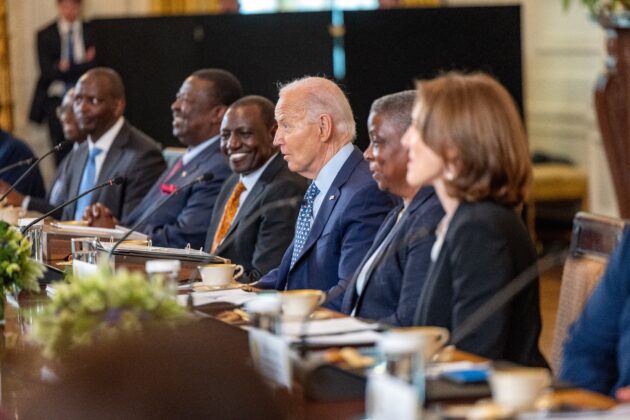
Why Kenya’s non-Nato ally status is crucial for regional security » Capital News
Kenya’s designation as a major non-North Atlantic Treaty Organisation (Nato) ally by the US elevates its role in regional and international security at a time when 1,000 of its police officers prepare to battle gangs in Haiti’s besieged capital, Port-au-Prince.
The announcement came as Kenya’s President William Ruto embarked on a historic state visit to the US to discuss with President Joe Biden the much-awaited deployment to the Caribbean nation and other bilateral issues.
Kenya becomes just the fourth African nation to attain the status, and the first in sub-Saharan Africa, cementing Kenya’s status as one of the US’s closest allies on the continent.
Washington pledged $200m (£157m) to Nairobi for the UN-backed Haiti mission, drawing confidence from Kenya’s long history of supporting regional peace initiatives, with relative success.
Kenya is currently overseeing a peace deal that ended Ethiopia’s two-year civil war in the northern Tigray region. Mr Ruto has also been mediating among countries in the Great Lakes region deeply divided by the chronic rebel insurgency in eastern DR Congo.
Since 2011, the Kenyan military has been fighting the al-Shabab Islamist group in neighbouring Somalia. A US military base located in Kenya’s coastal county of Lamu has been the backbone of those counterinsurgency operations.
This dependability is crucial for the US, which is being eclipsed by Russia and China, particularly in parts of West Africa, where Western forces have been forced to drastically draw down their presence.
What difference will it make?
As a non-Nato ally, Kenya will have privileged access to sophisticated military equipment, training and loans to augment defence spending.
However, the US is under no obligation to provide it with direct military assistance and Kenya is not mandated to send troops for Nato operations.
Despite the threat from al-Shabab, which has staged several attacks on Kenya, its military spending has often been moderate compared with its neighbours in the East African Community (EAC).
Small-scale incursions are common along the 680 km (420 mile)- border between Somalia and Kenya.
Al-Shabab has also claimed a handful of deadly, high-profile attacks within Kenya, including the 2013 raid at the Westgate mall in the capital Nairobi where more than 70 people were killed.
Since the start of 2024, al-Shabab has claimed about 30 attacks in Kenya, according to data collected by BBC Monitoring from the militant group’s media outlets.
These have been concentrated in the border counties of Lamu, Garissa, Wajir and Mandera. The majority of casualties have been Kenyan security forces.
As African Union peacekeepers leave Somalia at the end of this year, Kenya plans to heighten its presence along the border.
The elevated security status could improve Kenya’s focus on intelligence gathering and strategic deployments.
Kenya’s involvement in eastern DR Congo was a test of the military strength of a regional force of EAC member states.
The deployment was deemed a failure as troops left less than nine months after entering the central African nation, and insurgents continued to gain momentum.
However, the US has continued to use Kenya to exert influence over efforts to mediate the conflict and ensuing tensions.
While armed confrontations are off the table, President Ruto is expected to receive 16 US-made helicopters and 150 armoured vehicles that could significantly boost a Kenyan-led mission.
Haiti mission
While Kenya has vast experience in international peacekeeping, including during the civil wars in Sierra Leone and Liberia, Haiti is uncharted territory.
Nearly 100 gangs have made Port-au-Prince their battleground following the assassination of President Jovenel Moise in 2021. The instability which saw more than 300,000 people forced from their homes eventually forced Prime Minister Ariel Henry to resign this year.
As they seek territorial control, Haitian gangs have also been engaged in an arms race. The majority of their weapons are smuggled in from the US, the Dominican Republic, Jamaica and Colombia.
The UN Office on Drugs and Crime found earlier this year that gangs are armed with Russian AK47s, US-made AR-15s and Israeli Galil assault rifles.
US funding could enable Kenyan police, who are chronically disadvantaged with poor equipment and training, to gain access to rifles, armoured vehicles and adequate ammunition to face down gangs.
How other African countries have benefited from the designation?
The non-Nato ally status remarkably upgraded the militaries of Tunisia, Morocco and Egypt.
Tunisia’s military strength changed considerably once it earned the status in 2015, coinciding with budgetary and operational reforms.
Egypt, which has one of the most reputable armies in the world, has had the designation since 1989 as it formed the cornerstone of US diplomatic forays in North Africa and the Middle East.
Morocco has gained extensive experience in counterterrorism as militants from the Islamic State (IS) group seek a foothold in parts of North Africa.
The kingdom has been hosting the largest military exercise on the continent since 2007 dubbed “African Lion”.
This year’s edition features 7,000 military personnel from 20 African and Nato states receiving tactical training.
